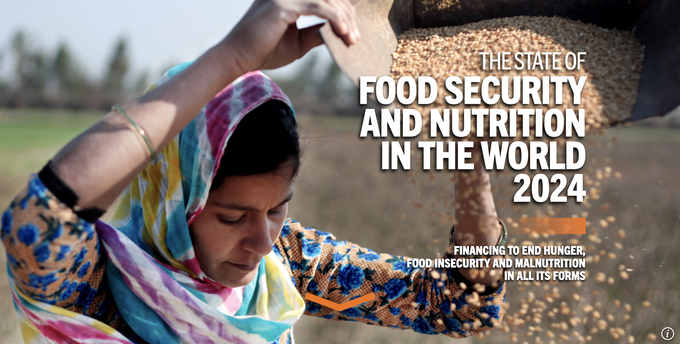December 21, 2025 | 08:35 GMT +7
December 21, 2025 | 08:35 GMT +7
Hotline: 0913.378.918
December 21, 2025 | 08:35 GMT +7
Hotline: 0913.378.918

FAO Report: The State of Food Security and Nutrition in the World 2024.
The current era is marked by escalating conflicts, increasing frequency and intensity of extreme weather events and disasters, and profound economic shocks that drive migration as people seek to escape harsh conditions.
Against this backdrop, the Food and Agriculture Organization of the United Nations (FAO) reaffirms its unwavering commitment, enshrined in its Constitution, to collect, analyze, interpret, and disseminate information on nutrition, food security, and agriculture.
FAO’s work in this domain has since been acknowledged by governments and many other stakeholders for its neutrality, reliability, and rigor.
This work began in 1946 with the First World Food Survey and continued through 1996, when 192 countries at the World Food Summit recognized FAO’s hunger statistics as a global benchmark.
From 1999 to 2015, FAO’s Prevalence of Undernourishment (PoU) indicator served as the global standard for tracking progress toward the first Millennium Development Goal — eradicating hunger. Also in 1999, FAO was tasked by its member countries to publish the annual State of Food Insecurity in the World (SOFI) report.
In 2015, with the adoption of the 2030 Agenda for Sustainable Development, FAO was once again recognized as a neutral, reputable, and trusted organization responsible for monitoring key aspects of the Agenda, including food security. In response, FAO has collaborated with four other UN agencies — WFP, UNICEF, WHO, and IFAD — to continue producing timely, reliable, and relevant data through the annual SOFI, which has been renamed as State of Food Security and Nutrition in the World report.
FAO employs rigorous statistical methods to generate food security data, particularly the Prevalence of Undernourishment (PoU) indicator. These methods have undergone extensive scrutiny, peer review, and evaluation by leading global experts. The PoU methodology was formally approved by member countries at the United Nations Statistical Commission in March 2017, endorsed by the Economic and Social Council (ECOSOC) in June 2017, and ultimately adopted by the UN General Assembly in July 2017 as part of the SDG indicator framework.
The data used in these estimations, particularly on food availability, are requested and received from national authorities in each member country. When national data are unavailable, FAO employs rigorous, transparent statistical processes to derive estimates using the best available sources.
FAO ensures that its data sources and methodologies are extensively documented and publicly accessible. Furthermore, the Organization collaborates closely with national authorities to clarify statistical processes and methodologies in a highly transparent manner. FAO also conducts extensive capacity-building programs to strengthen institutional and technical competencies in member countries, encouraging the computation of national-level indicators and relevant statistics on agriculture and food security.
FAO adheres to the highest professional standards in data collection, analysis, and dissemination, aligning with the Principles Governing International Statistical Activities. The Organization follows strategies and priorities set by member countries, in line with the Paris Declaration on Aid Effectiveness, the Accra Agenda for Action, and the Dakar and Busan Declarations. Additionally, FAO promotes the adoption of international statistical standards developed in close consultation with national statistical authorities.
FAO has a proven track record of collaboration, transparency, accountability, and mutual respect in its relationships with national authorities. The Organization welcomes open, transparent, and documented dialogue with member countries regarding its work, always assuring the highest standards of technical expertise, transparency, and neutrality.
(FAO)

(VAN) The global population is expected to grow in the coming years. This means higher demand for animal protein, and therefore, challenges and opportunities for the animal nutrition industry.

(VAN) $58.8 million from Global Environmental Facility targets efforts in Bangladesh, DR Congo, India, Mexico, Senegal, Tanzania and Ukraine.

(VAN) Chinese industry groups are urging a suspension of phosphate fertilizer exports, a move that may tighten global supply and push up prices just as U.S. farmers prepare for spring planting.

(VAN) OMB Director Russell Vought said the National Science Foundation "will be breaking up" the National Center for Atmospheric Research in Colorado.

(VAN) Budget-friendly drive-through and convenience store coffee locations are seeing strong, sometimes double-digit, growth in visits.

(VAN) 2025 AQUASTAT Water Data indicates that pressure on freshwater resources is growing as demand increases in regions of scarcity.

(VAN) Planet-warming pollution rates exploded after the end of World War II. James Watt’s steam engine launched the Industrial Revolution in 1769.